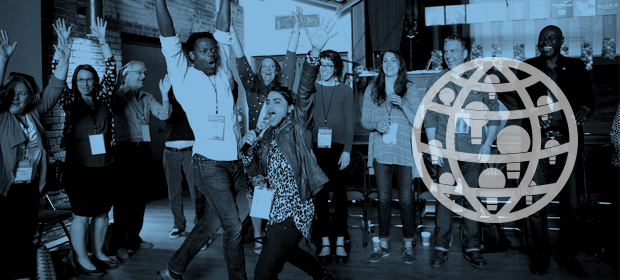Where We Work
See our interactive map


The future of global health starts with all of us.
What do dogs, HIV care, and the Galapagos Islands all have in common?
They are all integral parts of the One Health approach to improve the future of global health for centuries to come.
Human health doesn’t exist in a bubble. Our world is interconnected in ways we have yet to understand. So we need to learn more about the connections between the health of humans, animals, and the environment.
Current global megatrends may make it seem like the future is daunting. Noncommunicable diseases (NCDs) are rising—the World Health Organization estimates that they kill 40 million people each year, accounting for 70% of deaths worldwide. Urbanization is increasing the prevalence of airborne diseases, causing around 7 million premature deaths annually. And the earth is warming at a much faster rate than expected. Globally, around 1 million animal and plant species are now threatened with extinction within decades, and the rate and size of climate disasters are increasing
“If we don’t get this right, we are in great peril.” - Tim Mastro, chief science officer at FHI360
We can begin to understand how these megatrends are connected and influence each other by first acknowledging that local and global health are interconnected.
“We often stovepipe our species as if they have nothing to do with the global community,” said Dennis Carroll, the former director of the U.S. Agency for International Development’s Global Health Security and Development Unit, at the 2019 Triangle Global Health Conference last month where One Health was the theme of the event.
Take Sentinel Biomedical, for example. A research company in Raleigh, NC, they are studying the connections between humans and dogs. Using the daily movements of dogs—the biological and environmental influences they are exposed to—they are predicting patterns in canine cancer. And since humans and dogs share similar environmental influences, they are also going a step further to use canine cancer patterns to predict patterns in human cancer.
"Our research is making canines true watchdogs in the area of human health.” - Sentinel Biomedical
Connecting humans to the environment, the University of North Carolina at Chapel Hill (UNC) and the Universidad San Francisco de Quito (USF) in Ecuador have partnered to create the Center for Galapagos Studies, which advances conservation efforts in the Galapagos and promotes a better understanding of ecologically sensitive and protected areas worldwide.
Jill Stewart leads a monitoring project at the center that detects and tracks pathogens in the water. Since the islands are mostly undeveloped by people, they provide great research grounds for studying the impact of human development on the ecosystem.
“We learn lessons in the Galapagos that we can apply to North Carolina and elsewhere across the globe,” Stewart said. But without help from USF Quito, none of their work would be possible. “They help open doors for us,” she added. “Having the science center there has been an opportunity to work across departments and with international partners to address the big environmental challenges affecting us globally.”
Diverse partnerships are crucial to improving the global health landscape. This includes our partnerships around the world, of course, but also the partnerships we form in our own back yards. Here in North Carolina, we’re lucky to be surrounded by like-minded organizations that are working to improve global health and well-being.
“We must build trust among our partners and commit time to building them, for without partnerships, we won’t go very far,” says IntraHealth’s President, Pape Gaye. “We need to prioritize cultural competencies and prepare ourselves to accept the reality that we can trust people who view the world differently.”
That’s why IntraHealth International takes a localization approach in our own work. For example, through the U.S. Agency for International Development’s Accelerating Support to Advanced Local Partners (ASAP) project, we’re currently working with local organizations and governments in sub-Saharan Africa to strengthen their capabilities and resources to address HIV within their populations.
But this project is just the beginning because we know that we all need to work as one to turn around discouraging global megatrends and address human and environmental health together.




